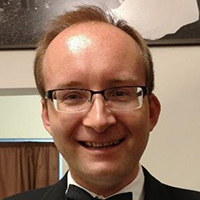
Sergei V. Kalinin, University of Tennessee, Knoxville
Sergei V. Kalinin is a Weston Fulton chair professor at the University of Tennessee, Knoxville. In 2022 – 2023, he has been a principal scientist at Amazon (special projects). Before then, he had spent 20 years at Oak Ridge National Laboratory where he was corporate fellow and group leader at the Center for Nanophase Materials Sciences. He received his MS degree from Moscow State University in 1998 and PhD from the University of Pennsylvania (with Dawn Bonnell) in 2002. He has >15 years of experience applying AI in experimental physical sciences from data analytics, theory-experiment matching, and automated and autonomous microscopy and materials synthesis. His research focuses on the applications of machine learning and artificial intelligence methods in materials synthesis, discovery, and optimization, automated experiment and autonomous imaging and characterization workflows in scanning transmission electron microscopy and scanning probes for applications including physics discovery, atomic fabrication, as well as mesoscopic studies of electrochemical, ferroelectric, and transport phenomena via scanning probe microscopy. Kalinin has co-authored >650 publications, with a total citation of ~50,000 and an h-index of >112. He is a fellow of AAIA, MRS, APS, IoP, IEEE, Foresight Institute, and AVS; a recipient of the Feynmann Prize of Foresight Institute (2022), Blavatnik Award for Physical Sciences (2018), RMS medal for Scanning Probe Microscopy (2015), Presidential Early Career Award for Scientists and Engineers (PECASE) (2009); Burton medal of Microscopy Society of America (2010); 5 R&D100 Awards (2008, 2010, 2016, 2018, and 2023); and a number of other distinctions.